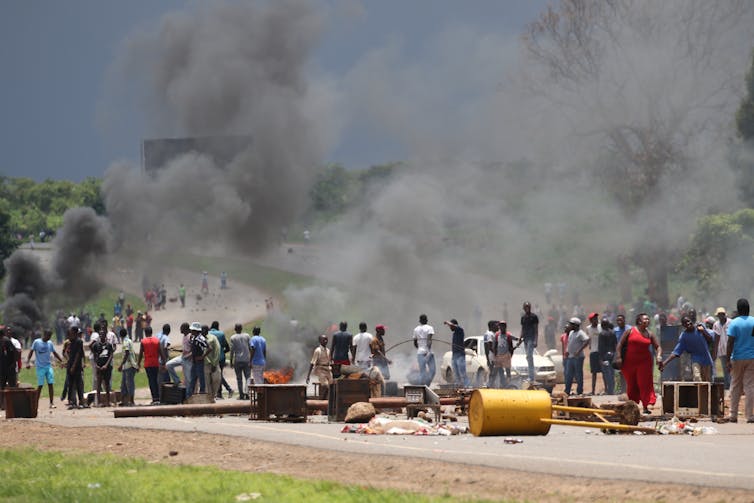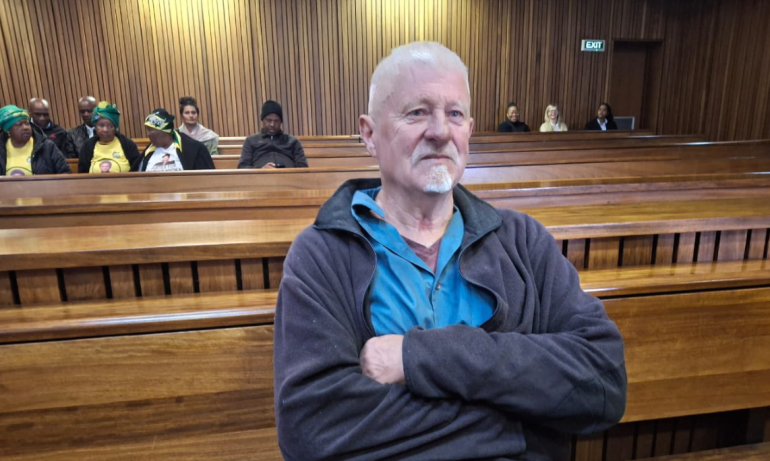What needs to be done to stop Zimbabwe’s violent meltdown

EPA-EFE/Aaron Ufumeli
Zimbabwe is sliding into a violent meltdown and it’s expected to worsen, unless there are some serious interventions.
Days of mass protests have been characterised by violence, looting and heavy-handedness by the police and army. It has led to the deaths and injury of many people, largely in Harare and Bulawayo’s high-density areas. According to the Zimbabwe Human Rights NGO Forum, at least 12 people have been killed and thousands injured.
In addition to placing many urban areas under military siege, the government has also shut down social media platforms such as WhatsApp, Twitter and Facebook. These are viewed as the avenue through which the opposition and other civil society bodies have been communicating messages of “anarchy”. The internet has been shut down twice on separate occasions.
The deadly violence was triggered by President Emmerson Mnangagwa’s announcement of steep fuel price hikes on Saturday 9 January. Made in the dead of night, the announcement proved to be the straw that broke the camel’s back for a largely peaceful, if not somewhat passive, populace that has borne the brunt of two decades of economic meltdown. Mnangagwa’s regime increased the prices of fuel by a staggering 150%, making Zimbabwe’s fuel the most expensive in the world.
The sharp fuel hike prompted the country’s largest trade union body, the Zimbabwe Congress of Trade Unions, and other civil society bodies such as the Crisis Coalition, to call for a three day mass stay away from work.
The reaction was hardly surprising. Conditions have become fertile for a massive militant mass revolt. Shortages of a lot of goods have become the order of the day. Long fuel queues, and incessant electricity and water cuts have not helped the situation for poverty-weary Zimbabweans.
Mnangagwa, and those he can rally behind him in the ruling Zanu-PF, need urgently to take steps towards forming a government of national unity, as has been done before in the country. This will require the opposition Movement for Democratic Change Alliance (MDC-Alliance) to get its act together by behaving maturely. Another urgent step that’s needed is that the country’s chaotic currency situation needs immediate resolution.
Read more:
Bold steps Mnangagwa should be taking instead of fiddling with the petrol price
Currency crunch
Prior to the deadly protests, Zimbabweans endured a tumultuous few months economically as the country’s cash crunch worsened.
Just before Professor Mthuli Ncube was appointed Minister of Finance in September 2018, he said he wanted to phase out the country’s quasi-currency, the bond note, nicknamed “bollars” by the market. The rationale behind scrapping the bond note was that it was promoting the black market, as individuals were using this quasi-currency to mop up scarce US dollars.
Ncube also argued that Zimbabwe needed to come up with its own proper currency, which could be recognised as legal tender.
The bond note was introduced in the second half of 2016 in a bid to ease the cash squeeze the country was facing as a consequence of using a multiple currency regime which was anchored by the US dollar. But a lack of investment in Zimbabwe, combined with few exports, meant that the US dollar was not readily available on the market.
The bond note was meant to fill the cash gap on the market. Instead, it spawned a flourishing black market last witnessed during Zimbabwe’s dark days of hyperinflation in 2008. Dealers, including top government officials, used the quasi-currency to mop up scarce US dollars on the market.
The Zimbabwean government has consistently argued that the bond note is equivalent to the US dollar. But the market has suggested otherwise. Most retailers have a three-tier pricing system – US$, bond notes or Ecocash, the country’s PayPal like service that is making transactions possible. The reason for providing these options is the shortage of US dollars and the bond notes. Those that are available are largely in the hands of currency speculators.
The bond note’s death knell, which was sounded by Ncube, has sparked panic and led to a devaluation of the quasi-currency. This in turn led to retailers increasing their prices of goods and services for people using bond notes.
The knock-on effect is that doctors, teachers and other civil servants are demanding that they be paid in dollars – not bond notes.
Shortages of foreign currency has also led to companies like Delta, the country’s largest brewer, failing to import adequate raw materials for alcohol and soft drinks.
Zimbabwe’s largest cooking oil producer, Olivine, has also closed shop, citing a lack of foreign currency to import raw materials for their products.
What needs to be done
To stem the tide of the current crisis, before it totally overwhelms Mnangagwa and the ruling Zanu-PF, the president needs to immediately cease the brutal onslaught on civilians. In addition, Mnangagwa and his officials have to get off their high horse and facilitate talks that can lead to a government of national unity with the Movement for Democratic Change Alliance (MDC-Alliance).
This has proved to be successful before. A government of national unity was formed in the wake of the violent elections in 2008 that plunged the country into chaos. The 2009-2013 government of national unity helped to stabilise the Zimbabwean economy and brought the country back from the brink.
The MDC-Alliance also has to stop fomenting acts of violence that have become the party’s hallmark since its leader Morgan Tsvangirai’s death in February 2018.
Lastly, Zimbabwe needs to introduce its own currency so the cancerous black market that’s been wreaking havoc on the economy can be eliminated.![]()
Tapiwa Chagonda, Associate Professor of Sociology, University of Johannesburg
This article is republished from The Conversation under a Creative Commons license. Read the original article.
Written by: Natasha
Similar posts
MORE ARTICLES

‘You are my heart in human form’: Lungile Thabethe’s touching letter to her daughter

Smart tax moves: A guide to boosting your tax refund

‘My husband won’t back me up when I discipline his kids’ – The Blind Spot

Kai Cenat graces the cover of Time Magazine’s first-ever TIME100 Creators List

Tebogo Thobejane pens emotional tribute to son on his 18th birthday
QUICK LINKS
UpComing Shows

959 Music Weekdays
Kaya 959 Hits
Real. Familiar. Memorable. Kaya 959 brings you the music you know and love from our playlist. Uninterrupted. Thursdays 20h00 to 21h00
close
The Best T in the City
With T Bose
He has held it down in the world of mid-morning radio with the best music, riveting topics, brilliant mixes and interesting guests. Every weekday, The Best T proves why he is the BEST by connecting to you like only your bro or favourite uncle could. He lets his listeners dictate the songs they want to hear in the ever-popular Top 10 at 10, and his Three Teaspoons never run out. Catch The Best T in the City Mondays to Fridays from 09h00 to 12h00.
close
Feel Good
With Andy Maqondwana
Feel good about feeling good! That's exactly what The Feel-Good show is about. An escape from the negativity that surrounds us, indulging you in good feels. Pass it on to one and all. Spread the good feeling around Gauteng with Andy Maqondwana.
close
The Hive
With Bonolo "Bee Sting" Molosiwa
Every "Hive" needs a Queen B and Bonolo "Bee Sting" Molosiwa is Kaya 959's honey who brings in the money. With her bubbly personality, infectious laugh, Bee Sting radiates positive energy which is all you need to get your weekend off to the best start. Don't miss the Afrobeat Dancehall Ragga (ADR) Top 10 on The Hive with Bee Sting every Saturday from 18h00 - 21h00.
closeConnect with Kaya 959
DownLoad Our Mobile App
© 2025 Kaya 959 | On The Street On The Air










